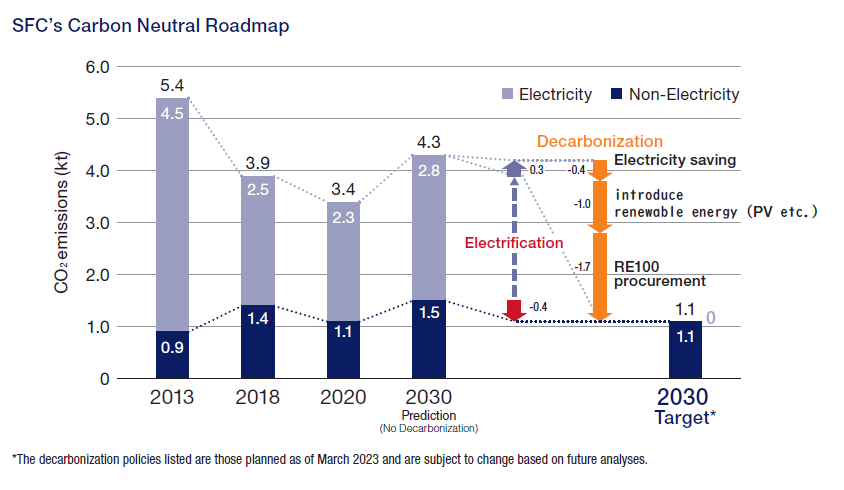Carbon Neutrality
Achieving Carbon Neutrality at Keio University
Keio University aims to convert all of its electrical energy consumption to renewable energy by 2030. Keio has a total of 6 campuses, and when the university hospital and affiliated schools are included, each differ greatly in their energy consumption rates, usage patterns, and potential for on-site solar panels, among other conditions. Taking these campus characteristics into consideration, we are conducting specific studies to move towards becoming carbon neutral. In particular, Shonan Fujisawa Campus (SFC), as a model carbon-neutral campus, has created a roadmap to switch to renewable energy. It is ahead of other campuses, with plans to install solar power systems.
*1 Carbon Offset Initiatives
SFC has started a carbon offset scheme for all city gas used on campus by switching over to carbon-neutral city gas.
In January 2024, we also launched the “Shachu Kyoryoku x Carbon Neutral Plan” as an initiative to gather the “environmental value” *2 generated by the households of Keio personnel (Keio alumni, faculty and staff members, etc.) and utilize it for Keio University’s carbon offsetting. We aim to become carbon neutral through university-wide cooperation.
Carbon offsetting is a concept in which members of society including citizens, corporations, NPO/NGOs, local municipalities, governments, etc., recognize their own greenhouse gas emissions and make proactive efforts to reduce them. For the portion of emissions that are difficult to reduce, they can purchase greenhouse gas reduction/absorption credits realized elsewhere or implement projects and activities that reduce or absorb greenhouse gases at other locations so as to offset all or part of their greenhouse gas emissions.
(From the Ministry of Agriculture, Forestry and Fisheries home page, “Carbon Offset”
https://www.maff.go.jp/j/kanbo/kankyo/seisaku/climate/jcredit/offset/carbonoffset.html; available in Japanese only)
Apart from the value of the energy itself, such as electricity and heat, it refers to the “added value” of not emitting carbon dioxide, which is considered one factor causing global warming.
By acquiring this environmental value, Keio University will have reduced its carbon dioxide emissions by the amount of that value, which will accelerate Keio’s carbon neutrality in addition to its efforts in energy conservation and reducing energy consumption.
Carbon Neutral policies at Shonan Fujisawa Campus
Shonan Fujisawa Campus (SFC) functions as a model for Keio University as a whole in its carbon neutral policies and is paving the way forward with its roadmap for converting over to renewable energy. SFC will convert to 100% renewable energy sources by the target year of 2030.This action plan involves energy conservation through replacing older lighting fixtures with LEDs, enforcing energy-saving practices, and improving energy efficiency within buildings on campus. The campus will also introduce solar power as its main source of renewable energy. An assessment of the potential for on-site solar power generation on campus revealed that approximately 30% of the campus could be self-sufficient by installing solar panels on building rooftops and carport roofs. To increase this percentage, SFC is planning on conducting a survey on the potential of using local biomass as an energy resource. The campus also plans to incorporate other environmental considerations into its carbon neutral policies such as biodiversity projects and recycling.

- Keio University Shonan Fujisawa Campus (SFC) Joins the Renewable Energy University League
- Introduction of Carbon-Neutral City Gas at Shonan Fujisawa Campus
- Shachu Kyoryoku x Carbon Neutral Plan
- Contribution of “environmental value” generated by households (available in Japanese only)
- Energy Consumption at Keio University (graph) (available in Japanese only)
- Energy Conservation Measures for AY 2025 (available in Japanese only)

